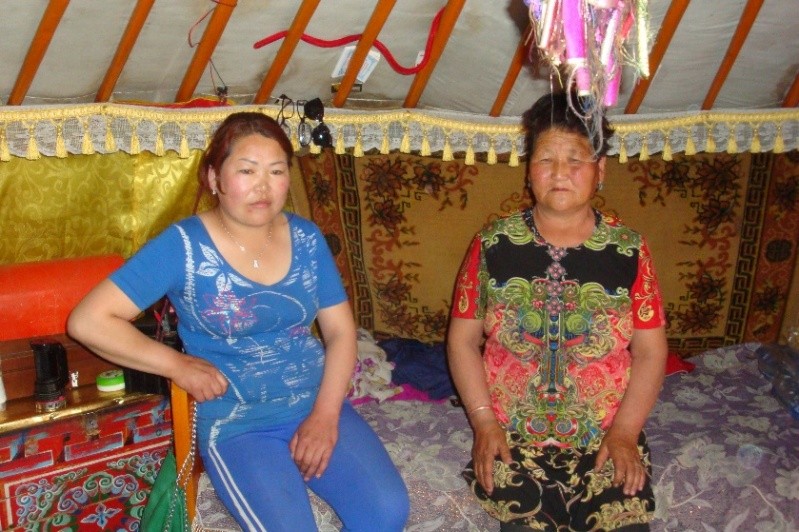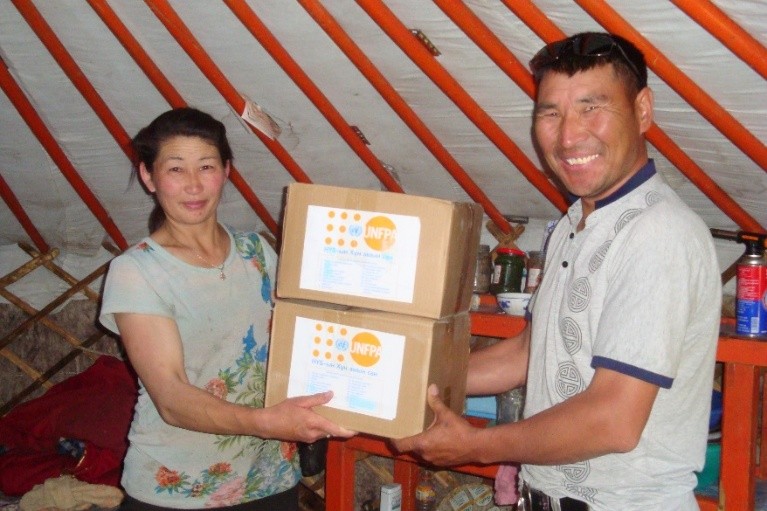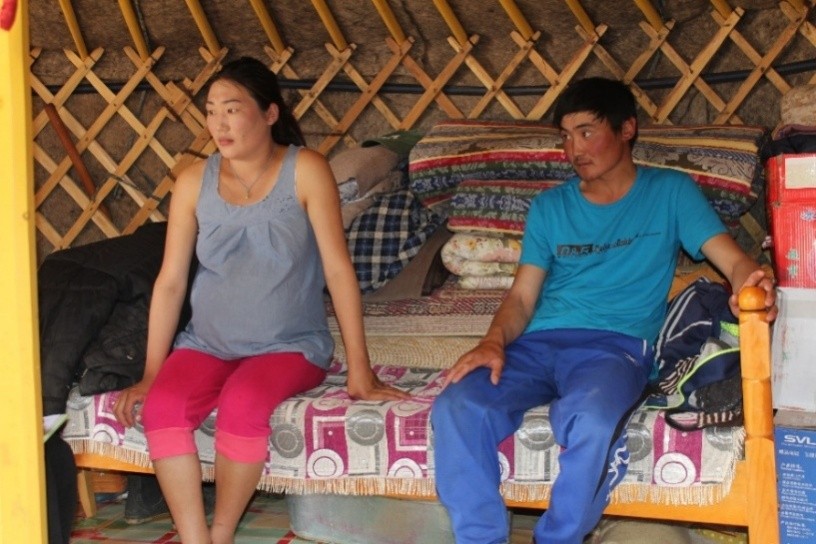Hear from some of the women who survived the Dzud disaster as UNFPA strives to give them assistance, while they carry on in the aftermath.
It is known that during a natural disaster or humanitarian crisis, women and girls are often left vulnerable and their sexual and reproductive health,safety and well-being are put at risk.
When the Dzud disaster hit Mongolia early in 2016, the extreme weather conditions (characterized by a dry summer and freezing winter with temperatures as low as -50C in some areas) affected thousands of herder households across the country.
UNFPA Mongolia responded, drawing from its own resources as well as from contributions of the UN Central Emergency Response Fund (CERF), by providing Dignity Kits to the women and girls from these affected communities. The Dignity Kits are assembled to provide basic sanitation and hygiene supplies to women and girls who would otherwise be unable to access them at the time of the disaster or in the aftermath. The kits include sanitary pads, underwear, bath and laundry soap, a towel, toothpaste and toothbrush, socks, washing powder, wet tissues, a comb and a nail cutter. It also includes safety items such as a torch with batteries and a whistle, as well as a booklet on sexual and reproductive health information.UNFPA Mongolia distributed 11,702 dignity kits to the girls and women of 6,260 families in 6 provinces, namely, Arkhangai, Bayankhongor, Uvs, Zavkhan, Sukhbaatar and Dundgovi, areas affected most by the Dzud. UNFPA Mongolia also gave financial support to soum centers in affected areas, enabling them to conduct outreach activities for pregnant women in partnership with the Ministry of Health and Sports.
Our team recently returned from monitoring missions in these areas, having met many women and girls now striving to pick up the pieces in the wake of the Dzud disaster. Their amazing accounts of everyday survival and how receiving Dignity Kits or medical attention in the midst of their struggle made a difference are no less than inspiring. Here are just a few of their stories.
Rina, 61 - Buutsagaansoum,Bayankhongor province

Rina is a herderwoman and a single mother . She lives with her son and two daughters, 23 and 14 years old, and a 4-year old granddaughter , residing close to the “bagh” center. For Rina, herding has been a way of life for 20 years. It is by no means an easy source of livelihood, but it is one that has sustained her and her family over the years.
It is no wonder that tears poured uncontrollably, as she told her story. This year’s Dzud brought a devastating loss, killing 60% of her family’s herd. The extreme weather left them with only 30 goats, not nearly enough to make a living.
Until thingw turn around, she relies on her pension as well as the monthly food voucher of 45,000 MNT(around $22 dollars) for her family provided by the government. Her daughter said that because the family income is often not enough to buy food and other basics, the household usually has to purchase personal hygiene products such as toothpaste, and soap from the store on credit, with the promise to pay later.
Under these limited circumstances, Rina said that supplies like sanitary pads for her two daughters are very costly. Thus, receiving two months worth of sanitary pads in the Dignity Kits brought welcome relief and some hope. Receiving the Dignity Kits for herself and her daughters, mader her “very happy” even at such a time of struggle.
Enkhbaatar‘s Family from Buutsagaansoum, Bayankhongor province

The family of 7 includes 2 teenage sons, and 3 daughters, 23, 10 and 5 years old respectively. The family received only 1 box of supplies during the distribution, so the team asked the soum officials to hand over 2 more Dignity Kits for their daughters.
The mother, reported that all of the items in the Dignity Kits were not only useful but she noted they were also of high quality. She shared that sanitary pads cost 2500-6000 MNT (around $1.2-$3) in a soum store. Due to their low income, she usually buys the cheapest sanitary pads when she goes to soum once every 2 months. There were even times that she couldn`t purchase sanitary pads for herself and her daughter, having had to resort to using pieces of cloth or cotton rags during menstrual days, which put them at risk for hygiene-related and health issues.
After the Dzud, the family income was under stress more than ever. “The Dignity Kits arrived at the right time for my family.” she said gratefully.
N.Ulziisaikhan, Chief Doctor of the soum hospital- Buutsagaansoum of Bayankhongor province

Dr. N. Ulziisaikhan works in a hospital that has abudget of 1,100,000 MNT (around $500) in a quarter, for undertaking the mobile health services. This is the service provided by soum centers to bring medical assistance to those who live far away from the soum and have little healthcare. She shared that due to a recent measles outbreak throughout the country , along with severe climatic events this year, the budget had been spent and the health center was in debt.
In which case, UNFPA’s assistance of 550,000 MNT (around $275) per soum which supported the outreach Ante-Natal Care(ANC) services for pregnant herder women, was deemd timely, very much welcome and highly appreciated.
Winter conditions brought heavy snow, especially in the areas of Bayanburd and 5th bagh. Due to this, pregnant women in the affected areas were unable to travel and access the planned ANC services. After receiving the assistance towards fuel costs from UNFPA Mongolia, soum doctors were able to immediately visit the pregnant women cut off-from the soum center and organize open-day events to see patients at least on 2 occasions in remote areas. During the time, they detected measles in at least 3 pregnant women and brought these expectant mothers to the soum hospital for treatment.
As of this report, the pregnant women are in good condition and one of them has reportedly had a safe delivery. Without the timely assistance by UNFPA Mongolia, Dr. Ulziisaikhan says that they could have not provided the much-needed ANC services and treated the infection, further putting lives of these women in danger.
By:A. Esguerra/ J. Solongo

